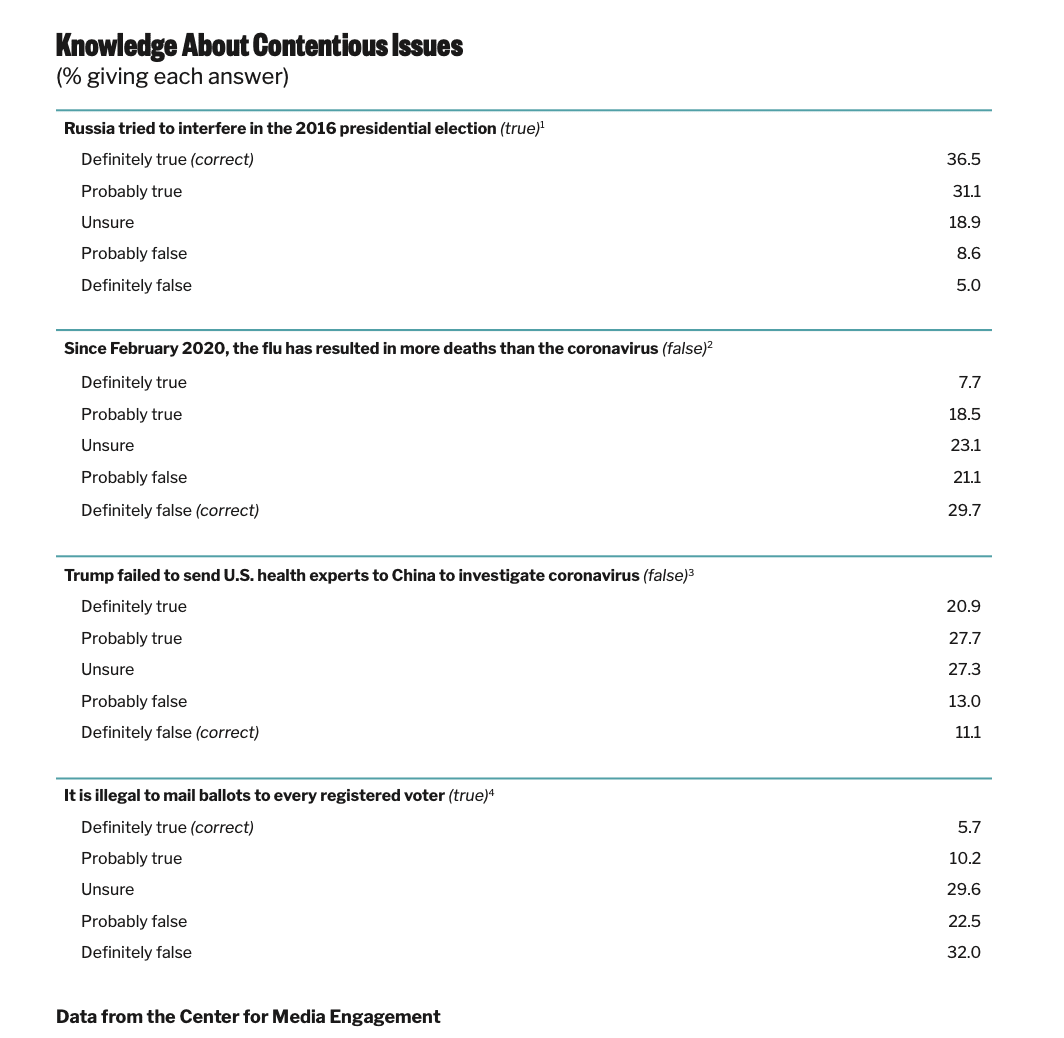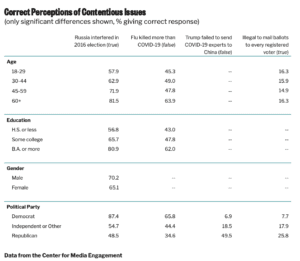
SUMMARY
Well-functioning democracies depend on well-informed citizens making rational decisions. But how much does the American public know about contentious political issues? To find out, the Center for Media Engagement asked 1,010 U.S. adults what they believed about a range of hot-button issues in August of 2020, just a few months before the 2020 presidential election.
The questions focused on four contentious issues: Russian interference with the 2016 U.S. presidential election, whether the flu had killed more people than COVID-19, whether President Trump failed to send COVID-19 experts to China, and whether it is illegal to mail ballots to every registered voter in the U.S. (for a summary of the questions and responses, see the tables at the end of the report). The findings reveal substantial gaps in the American public’s understanding of these issues — and suggest that Americans’ perceptions of hot-button issues are largely driven by partisanship.
What Americans Know About Contentious Issues
Most respondents had a correct understanding of Russian interference in the 2016 U.S. presidential election. More than a third (36.5%) correctly answered “definitely true” to a statement asserting that Russia tried to interfere in the 2016 presidential election, and almost a third (31.1%) said that it was “probably true.” Only a small proportion (8.6%) said that the statement was “probably false” or “definitely false” (5.0%).
Respondents were less knowledgeable when it came to COVID-19. For a false statement claiming that the flu had resulted in more deaths than the coronavirus, fewer than a third (29.7%) correctly labeled it as “definitely false,” and just over a fifth (21.1%) said that it was “probably false.” Relatively few people (7.7%) called it “definitely true” and just short of a fifth (18.5%) said that it was “probably true.”
For a false statement asserting that Trump had failed to send U.S. health experts to China to investigate the coronavirus, respondents were less informed. Only about one in ten (11.1%) correctly said that it was “definitely false,” and just about one in eight (13.0%) labeled it as “probably false.” On the other hand, more than a fifth (20.9%) called it “definitely true,” and more than a quarter (27.7%) said that it was “probably true.”
The issue of illegal mail ballots turned out to be particularly tricky. A true statement claimed that it is illegal to mail ballots to every registered voter in the U.S. Just about one in twenty (5.7%) correctly labeled the statement as “definitely true,” and just over one in ten (10.2%) said that it was “probably true.” Conversely, almost a third (32.0%) said that the statement was “definitely false,” and nearly a quarter (22.5%) called it “probably false.”
Demographic and Partisan Differences
Older Americans More Knowledgeable about Some (But Not All) Issues
Older Americans were more knowledgeable about two out of four issues. Regarding the statement that correctly claimed that Russia had tried to interfere with the 2016 U.S. presidential election, more than eight in ten (81.5%) of those 60 or older correctly said that the statement was “probably true” or “definitely true.” These answers were given by just over seven in ten (71.9%) of those aged 45 to 59, by just over six in ten (62.9%) of those aged 30 to 44, and by fewer than six in ten (57.9%) of those aged 18 to 29.
When evaluating the false statement claiming that the flu had killed more people than the coronavirus since February, more than six in ten (63.9%) of those 60 or older correctly said that the statement was “probably false” or “definitely false.” In comparison, these answers were given by fewer than half of the other respondents (45.3% of those aged 18-29; 49.0% of those aged 30-44; 47.8% of aged 45-59).
Age was not related to knowing that Trump had not failed to send COVID-19 experts to China.
For the question about whether it is illegal to mail ballots to every voter in the U.S., the results were mixed. In each age group, between fourteen and seventeen percent of the respondents correctly labeled the statement as “probably true” or “definitely true,” suggesting that age might not be related to knowledge about this issue. However, older respondents were more likely to give the incorrect answer (“definitely false”) when evaluating this statement. Of those aged 60 and above almost half (47.9%) gave this answer, compared to fewer than four in ten (37.5%) of those aged 45 to 59, fewer than three in ten (29.3%) of those aged 30 to 44, and fewer than two in ten (18.3%) of those aged 18 to 29. This suggests that, on the whole, those aged 60 and above were the least knowledgeable when it came to the issue of the mail ballots.
Higher Education Predicts Knowledge of Some (But Not All) Issues
A similar pattern emerged for education. Higher education was linked to more correct evaluations for two of the four statements. When evaluating the statement asserting that Russia tried to interfere with the 2016 presidential election, more than eight in ten (80.9%) of those with a bachelor’s degree correctly said that the statement was “probably true” or “definitely true.” In comparison, fewer than seven in ten (65.7%) of those with some college education and fewer than six in ten (56.8%) of those with a high school education or less gave these answers.
For the statement purporting that the flu had claimed more lives than the coronavirus since February, more than six in ten (62.0%) of those with a bachelor’s degree correctly said that the statement was “probably false” or “definitely false.” These answers were given by fewer than half (47.8%) of those with some college education and by just over four in ten (43.0%) of those with a high school education or less.
For the two other statements — concerning whether Trump failed to send COVID-19 experts to China and whether it is illegal to mail ballots to every registered voter in the U.S. — education level was not related to knowledge.
Gender Rarely Related to Knowledge
Gender did not have much of an impact on the respondents’ perceptions of these issues. It only made a difference for one of the four issues. For the statement about Russian interference in the 2016 U.S. presidential election, more than seven in ten (70.2%) males correctly labeled the statement as “probably true” or “definitely true,” whereas slightly fewer (65.1%) females gave that response.
Partisanship Intertwined With Perception of Hot-Button Issues
Partisanship turned out to be the strongest predictor of Americans’ knowledge, even surpassing education. Partisanship was related to how U.S. adults perceived each of the four controversial issues we tested. Regardless of the statements’ actual validity, many partisans from both sides of the political spectrum were inclined to label statements that favored their party as true and to label statements that favored the other party as false.
When evaluating the statement — mostly congenial to Democrats — regarding Russia’s interference with the 2016 U.S. presidential election, almost nine in ten (87.4%) Democrats correctly said it was “probably true” or “definitely true,” whereas fewer than half (48.5%) of Republicans said so.
For the two false statements, partisans’ responses were closely related to their political preferences. For the statement claiming that the flu had resulted in more deaths since February than the coronavirus, close to seven in ten (65.8%) Democrats correctly labeled it as “probably false” or “definitely false,” whereas fewer than four in ten (34.6%) Republicans did so.
Conversely, for the statement asserting that Trump had failed to send U.S. health experts to China to investigate the coronavirus, almost half (49.5%) of the Republicans correctly labeled the statement as “probably false” or “definitely false,” whereas fewer than one in ten (6.9%) Democrats gave these responses. When evaluating a true statement — congenial to Republicans — which correctly said that it is illegal to mail ballots to every registered voter in the U.S., fewer than one in ten (7.7%) Democrats answered “probably true” or “definitely true,” whereas just over a quarter (25.8%) of Republicans gave these answers.

This survey was conducted between August 4 and 17, 2020 among 1,010 Americans aged 18 and over. Survey funding was provided by the John S. and James L. Knight Foundation as part of our connective democracy initiative. Polling was conducted by NORC at the University of Chicago as part of their AmeriSpeak panel.
Panelists were selected using area probability and address-based sampling and were recruited using mail, telephone, and face-to-face interviews. They were able to complete the study either online (n = 978) or via phone (n = 32). The 95% margin of error for this study, adjusted for the design effect, is +/- 4.09%. The sample is weighted for demographics (age, gender, race/ethnicity, and education) as well as Census division, housing tenure, and other aspects of the sampling design.
The sample was 53.2% female, 66.1% white, 10.1% Black, 15.4% Hispanic, 8.3% other, and represented all age groups (29.6% aged 18-29; 25.0% aged 30-44; 25.1% aged 45-59; and 20.2% aged 60 or above), education levels (22.0% high school or less, 42.7% some college, and 35.3% college degree or more), and political orientations (45.5% Democrats; 36.1% Republican; 17.6% Independent or Other, treating those who said that they leaned in favor of a party as partisans).
The exact wording of the four statements was as follows: Russia tried to interfere in the 2016 presidential election; Since February 2020, the flu has resulted in more deaths than the coronavirus; Trump failed to send U.S. health experts to China to investigate coronavirus; It is illegal to mail ballots to every registered voter. The possible answers were: Definitely true; Probably true; Unsure; Probably false; Definitely false.
To determine whether there were significant relationships between knowledge and respondents’ demographics and partisanship, we ran multiple linear regression analyses for each knowledge question using the full range of responses (e.g., we included all ages, as opposed to four categories). Only those that were statistically significant are shown in the table and discussed in the text.
SUGGESTED CITATION:
Overgaard, Christian Staal Bruun & Stroud, Natalie Jomini. (May, 2021). What Americans know and don’t know about contentious issues. Center for Media Engagement. https://mediaengagement.org/research/what-americans-know-and-dont-know-about-contentious-issues
- Mueller, R. S. (2019). The Mueller report: Report on the investigation into Russian interference in the 2016 presidential election. [↩]
- https://covid19.who.int/; https://ourworldindata.org/covid-deaths; https://www.cdc.gov/flu/about/burden/2018-2019.html; https://www.cdc.gov/flu/about/burden/2019-2020.html [↩]
- https://www.washingtonpost.com/politics/2020/04/03/how-much-pressure-did-trump-put-china-access-concerning-coronavirus/; https://www.factcheck.org/2020/04/bidens-misleading-ad-about-sending-experts-to-china/ [↩]
- https://www.nytimes.com/interactive/2020/08/11/us/politics/vote-by-mail-us-states.html; https://www.washingtonpost.com/graphics/2020/politics/vote-by-mail-states/; https://statutes.capitol.texas.gov/Docs/EL/htm/EL.86.htm; https://www.politifact.com/factchecks/2020/may/08/chris-kapanga/yes-its-illegal-hold-election-mail-wisconsin/ [↩]




